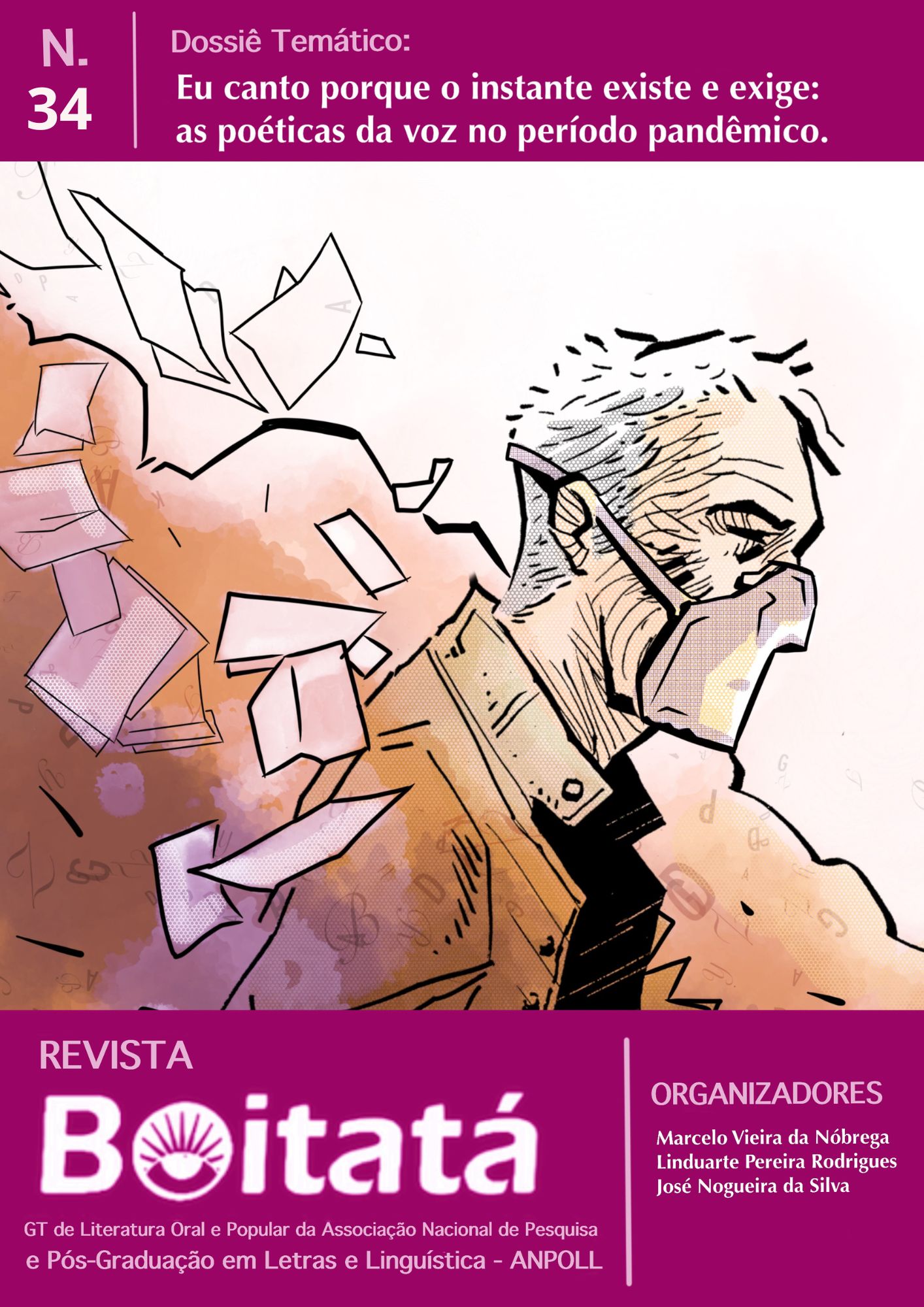Vidas-Mortes-Vidas Severinas em Tempos de Pandemia
Severe Lifes-Deaths-Lifes in Pandemic Times: hybridism of imprisoned voices of poets-apologists, cordelistas and repentistas in a WhatsApp group.
DOI:
https://doi.org/10.5433/boitata.2022v17.e46655Abstract
This work delimits the poetic production of repentistas and poet-apologists from the northeast, between 2020 and 2021, in the WhatsApp group Clube do Repente, during the Covid-19 pandemic. Created in August 2015, in the city of Campina Grande (PB), Clube do Repente is currently made up of 104 participants distributed as follows: 29 professional sudden dancers - 23 men and six women; six cordelistas; a poet-declaimer; and 68 poet-apologists. The results analyzed during the poetic production in CR, based on the two analytical categories I propose - Prison/Virtual Imprisonment and Overcoming/Resilience - point to a poetic production marked by a kind of poetic cycle that begins in anguish, despair and apprehension of death. and it closes with the promise of life in fullness. This aspect can lead us to the sense of coherence as a strong characteristic of popular cultures: unlike the cycle of life - which culminates in death - poetic production in this period walked in the opposite direction, that is, towards life, towards hope, to the vaccine, to the belief in science.
Keywords: Pandemic. Poetry. WhatsApp group. Imprisonment. Promise.
Downloads
References
AYALA, M. I. N. No arranco do grito: aspectos da cantoria nordestina. São Paulo: Ática, 1988.
AYALA, M. I. N. Riqueza de pobre e o conto popular: um fazer dentro da vida. Maricá: Ponto da Cultura Editora, 2011.
BOSI, A. (org.). Cultura brasileira: temas e situações. 2. ed. São Paulo: Ática, 1992.
BOSI, A. Literatura e resistência. São Paulo: Companhia das Letras, 2002.
BOSI, Alfredo. Cultura com tradição. In: BORNHEIM, G.; BOSI, A.; PESSANHA, J. A. M.; SCHWARZ, R.; SANTIAGO, S.; DUARTE, P. S. Cultura brasileira: tradição e contradição. Rio de Jorge Zahar Editor/Funarte, 1987. p. 31-58.
BOSI, E. O tempo vivo da memória: ensaios de psicologia social. São Paulo: Ateliê Editora, 2003.
CANDIDO, A. Literatura e sociedade. 9. ed. Rio de Janeiro: Ouro Sobre Azul, 2006.
CITALIARESTAURO. Quem eram as 9 musas?. Citaliarestauro.com, Lisboa, [2023]. Disponível em: https://citaliarestauro.com/quem-eram-as-9-musas/. Acesso em: 1 jan. 2022.
LE GOFF, J. História e memória. Campinas: Editora da Unicamp, 1996.
NÓBREGA, M. V. A cantoria de viola na contemporaneidade: seus poetas em performance e memórias; estratégias para formação poética de apologistas. 2020. Tese (Doutorado em Linguística) - Universidade Federal da Paraíba, João Pessoa, 2020. Disponível em: https://repositorio.ufpb.br/jspui/handle/123456789/18545. Acesso em: 12 jan. 2022.
REIS, Z. C. Ciência e paciência: o mestre Oswaldo Elias Xidieh. Estudos Avançados, São Paulo, v. 9, n. 23, p. 7-17, abr. 1995. Disponível em: https://www.revistas.usp.br/eav/article/view/8844. Acesso em: 12 jan. 2022.
VIEIRA, A. S. J. Sermões. Erechim: Edelbra, 1998. v. 3.
ZUMTHOR, P. Escritura e nomadismo: entrevista e ensaios. Tradução de Jerusa Pires Ferreira e Sonia Queiroz. Cotia: Ateliê Editorial, 2005.
ZUMTHOR, P. Introdução à poesia oral. Tradução de Jerusa Pires Ferreira. Belo Horizonte: Editora da UFMG, 2010.
Downloads
Published
How to Cite
Issue
Section
License
Copyright (c) 2022 Marcelo Vieira da Nobrega

This work is licensed under a Creative Commons Attribution 4.0 International License.
Boitatá esta licenciada com CC BY sob essa licença é possível: Compartilhar - copiar e redistribuir o material em qualquer suporte ou formato. Adaptar - remixar, transformar, e criar a partir do material, atribuindo o devido crédito e prover um link para a licença e indicar se mudanças foram feitas.






















